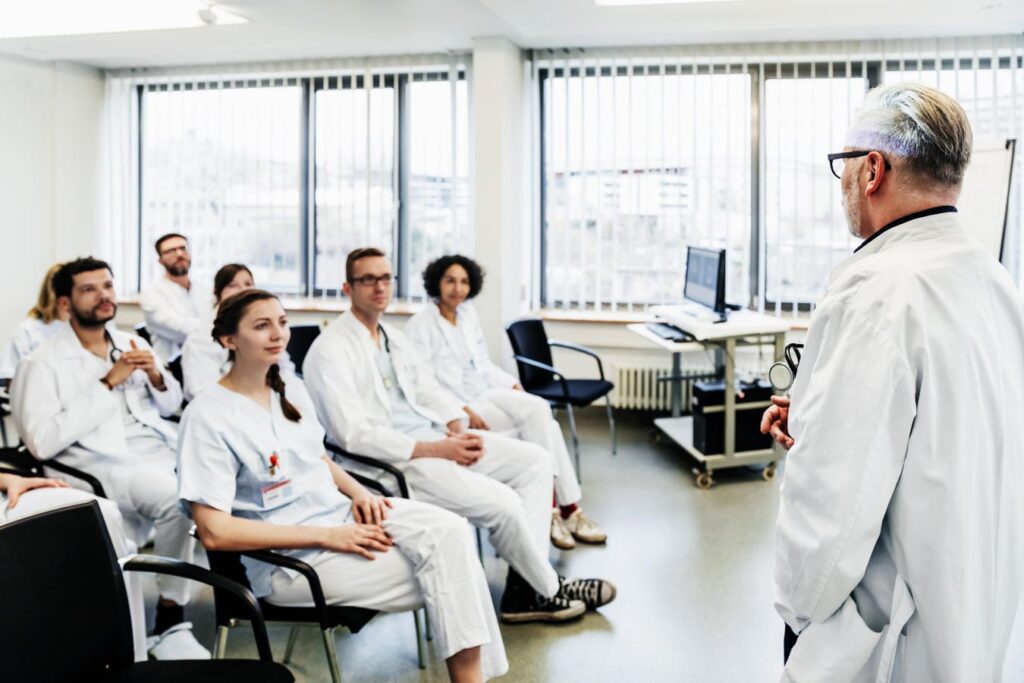The most powerful aspect of learning to lead better is that it transcends specific settings. It works in the hospital and the clinic, it works at home, it works with relationships, it works with your pets. Leadership is leadership is leadership.
getty
A point I like to make in my writing and keynotes is that leadership can be taught. I don’t think it’s a matter of talent or luck of the genetic draw. Yes, some people are seen as natural leaders, but that’s typically after years of growth and development—and the influence of family, community, church, sports teams, and the like. Which makes me believe leadership is largely learned. The most powerful aspect of learning to lead better is that it transcends specific settings. It works in the hospital and the clinic, it works at home, it works with relationships, it works with your pets. Leadership is leadership is leadership.
Most of us have seen examples of this skill transfer. West Point, for example, is designed primarily to teach combat leaders, not surgeons (although many surgeons have graduated from West Point over the centuries). But the high-stakes leadership skills learned in this environment carry across multiple domains.
Being subjected to stress and adversity forces you to know yourself better—your strengths and your weaknesses. It also teaches you how to find your calm center amidst an onslaught of stressful stimuli and make good decisions. And it builds resilience.
There are a lot of parallels between military and medical school training. The leadership programs you experience in the military often start by “breaking you down.” By putting you in highly stressful training environments, the trainers look to assess your capabilities. First, can you even make it through the exercise without quitting or getting injured? Second, can you perform in those environments? Can you excel? When you’re in a follower role, do you listen well? Are you paying attention well enough to execute the plan? Do you communicate the plan effectively to your teammates? When you’re in a leadership role, can you understand all the mission’s parameters and demands? Can you come up with a tactical plan to influence and inspire others, even though they’re all tired, stressed, and perhaps in heightened fear?
Medical school training, which is its own form of leadership program, works similarly, though with a different slant. Cognitive pressure, at a very high level, is exerted. A vast amount of information assails you, such that it seems impossible to process and retain it all. The common metaphor is that it’s like drinking through a fire hose. It’s extremely stressful because you don’t want to fail out. You don’t even want to get a B because you know the information you’re learning is going to be vital in taking care of future patients.
When you graduate from medical school, residency programs take it a step further. A lot of information is still thrown at you, but you’re also doing hands-on care of patients and making treatment decisions (with supervision). There’s a great deal of pressure. But when you ultimately get to the point where you’re independently making decisions and leading in a high-stakes environment, you’ve gained a resilience that is deep-rooted and visceral.
That’s why I’m not a huge fan of downplaying the importance of the stress commonly associated with medical training. When you’re finished with training, you’re going to be taking care of patients. This is an extremely important, dare I say sacred, responsibility and authority. And there is tremendous stress associated with it. Strength and resilience are required, and those traits are not forged through easy, low-pressure instruction. Olympic athletes in training don’t avoid stress, hardship, and conflict. They seek it out.
Of course, a balance must be struck. We certainly don’t want medical students and residents to suffer from psychiatric diagnoses, but it is crucial that they learn how to deal with adversity—patients who die or fail to respond to treatment, onrushes of ill and injured patients, etc.—and are able to get back up, brush themselves off, and take care of the next patient. The best way to learn and internalize this kind of skill is by going through a leadership program that delivers sequentially increasing levels of stress, with watchful management.
Read the full article here
